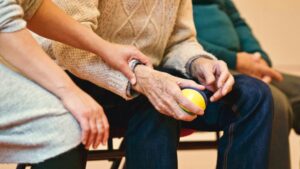As we age, our metabolism naturally slows down, and this can lead to a variety of health issues. A slower metabolism means that our body is not able to burn calories as efficiently, which can cause weight gain, fatigue, and a variety of other health problems. In this article, we will explore the causes of a slow metabolism in the elderly, as well as some solutions to help speed up the metabolism and promote overall health and well-being.
Causes of a Slow Metabolism in the Elderly
There are many factors that contribute to a slower metabolism in the elderly. One of the primary causes is a decrease in muscle mass. As we age, we tend to lose muscle mass, and this can cause a decrease in our overall metabolism. Another cause of a slower metabolism in the elderly is a decrease in physical activity. As we age, we tend to become less active, which can contribute to a decrease in metabolism.
Other factors that can contribute to a slower metabolism in the elderly include hormonal changes, poor diet, and medications. Hormonal changes, such as a decrease in thyroid hormone, can lead to a slower metabolism. A poor diet that is high in sugar, unhealthy fats, and processed foods can also contribute to a slower metabolism. Certain medications can also slow down the metabolism, such as those used to treat high blood pressure, depression, and anxiety.
Solutions to Speed Up Metabolism in the Elderly
While a slower metabolism is a natural part of the aging process, there are some solutions that can help to speed up metabolism in the elderly. One of the most effective ways to boost metabolism is through regular exercise. Even light exercise, such as walking or gardening, can help to increase metabolism and promote overall health and well-being.
Another solution to help speed up metabolism in the elderly is through a healthy diet. Eating a diet that is high in protein, healthy fats, and whole foods can help to increase metabolism and promote overall health. It is also important to stay hydrated by drinking plenty of water and other healthy fluids.
In addition to exercise and a healthy diet, there are also supplements that can help to speed up metabolism in the elderly. One such supplement is Tea Burn. Tea Burn is a natural proprietary formula that is designed to increase the speed and efficiency of metabolism when combined with tea. It is made with all-natural ingredients and is designed to be tasteless and dissolvable, making it easy to use with any type of tea. Tea Burn is also designed to target and neutralize the teeth-staining tannins found in tea to help deliver noticeably whiter, healthier-looking teeth and a brighter smile.

How can Tea Burn help?
Tea Burn is a natural and effective solution for older adults looking to boost their metabolism and improve their overall health and wellbeing. The proprietary, patent-pending formula in Tea Burn has been designed to increase the speed and efficiency of metabolism when combined with tea, which can help older adults maintain a healthy weight and improve their energy levels. In addition, Tea Burn contains immune-boosting vitamins and a patent-pending nutritional complex designed to amplify the health benefits of tea, while neutralizing its downsides. This can be especially beneficial for older adults, who may be more susceptible to illness and can benefit from the immune-boosting properties of Tea Burn.
know more about Tea Burn: click here
A slower metabolism is a natural part of the aging process, but it can lead to a variety of health problems in the elderly. Regular exercise, a healthy diet, and supplements such as Tea Burn can help to speed up metabolism and promote overall health and well-being in the elderly. If you are an elderly person looking to improve your metabolism and overall health, consider incorporating Tea Burn into your daily routine. With its natural proprietary formula and tasteless, dissolvable packets, Tea Burn is a convenient and effective solution for anyone looking to boost their metabolism and promote better health.
Read also:UTI in Older Adults: Causes, Symptoms, and Prevention





